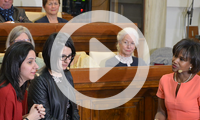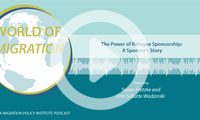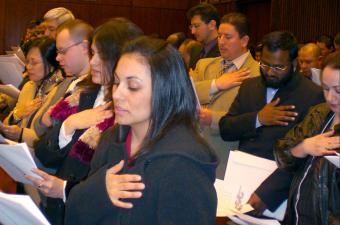Integration Policy
Recent Activity

Coordination and communication among key stakeholders in the resettlement network have never been more critical. This conversation focuses on how consultation supports capacity building and where it can, at times, fall short.

With the Global Refugee Forum approaching, this webcast explores how municipalities and other key stakeholders can be engaged in informing and delivering on the 2024 resettlement and complementary pathways pledges.

White House and Department of Health and Human Services officials join a leading language access advocate and MPI's Margie McHugh in a conversation exploring executive-branch efforts related to language access provision, upcoming actions, and opportunities to improve the provision of information and services in languages other than English in federal programs.

How is refugee resettlement evolving? As more countries turn to private or community sponsorship, MPI speaks with Erin Schutte Wadzinski, who leads one of the pioneering private sponsorship groups in Worthington, Minnesota, under the Welcome Corps initiative.
The 20th annual Immigration Law and Policy Conference, organized by MPI, Catholic Legal Immigration Network, Inc., and Georgetown University Law Center, features fresh, thoughtful policy and legal analysis, and discussion of some of the top immigration issues by leading government officials, attorneys, researchers, advocates, and other experts.
















A Shrinking Number of DACA Participants Face Yet Another Adverse Court Ruling
Investing in the Future: Higher Ed Should Give Greater Focus to Growing Immigrant-Origin Student Population
Prolonged Ukrainian Displacement: An Uneasy Marriage of Reception, Integration, and Return Policies
Apprenticeship Programs Are a Promising Solution to Bring More Multilingual Workers into Early Childhood Field
Why the European Labor Market Integration of Displaced Ukrainians Is Defying Expectations
The Public-Charge Final Rule Is Far from the Last Word
The Los Angeles Declaration Could Represent a Big Step for Real Migration Cooperation across the Americas
Schools Should Engage Diverse Community Stakeholders to Promoting Equitable Allocation of Historic Funding to Reimagine Education
The Ukrainian Conflict Could Be a Tipping Point for Refugee Protection
Straight Path to Legal Permanent Residence for Afghan Evacuees Would Build on Strong U.S. Precedent
Pages